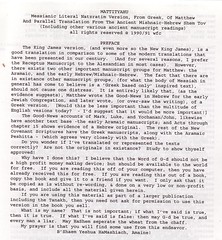The purpose of this page is to collect versions where the translator(s) are unknown or anonymous.
Messianic Literal Natzratim Version of Matthew
Click here for sample verses from the Messianic Literal Natzratim & Parallel Version
Title: Mattityahu ⁕ Messianic Literal Natzratim Version, from Greek, of Matthew - and Parallel Translation from the Ancient Mishnaic–Hebrew Shem Tov (including other various ancient manuscript readings)
Date: 1990/91 wfc
¹
Publisher: None given. (May be James S. Trimm but this is unconfirmed)
Contents: Gospel of Matthew in two versions. Appendix: Ancient Sayings around the 1st Century AD/CE Era. Other Sources, Helps, and recommended reading. Commentary on Mattityahu / Matthew
Images: Cover, Title
Location: Collection Bibelarchiv-Birnbaum. Karlsruhe/ Baden, Germany
Comments: Manuscript print in letter format, unpaginated (154 pp). There‘s no indication who translated the Natzratim Version from the Greek and Shem Tov´s Hebrew version into English. A possible candidate is James S. Trimm. Both versions are presented in parallel columns. In the undated Preface the author states that he prefers the Receptus group of manuscripts to the Alexandrian group; he also explains that two Hebrew / Mishnaic manuscripts of Mattityahu could be based on a, what he calls, „travel- journal“, which Matthew wrote during his walk with Yeshua and that a composition has been made from these notes. This results in several Hebrew/ Aramaic versions to which there‘s access today. This composition is being shown on the left column. The reading on the right is that of Shem Tov ben-Yitzchak Ibn Shaprut, in a Judaic treatise: The »Even Bohan«, which was evidently copied from an ancient Mishnaic- Hebrew version of Matthew (14th century C.E); this, our Author says, it held to be an original Hebrew composition, [but, critics (e. g. Pinchas E. Lapide) say that the Shem Tov manuscript is clearly translated from a Greek version]. - Many alternate manuscript readings are taken into consideration and shown in the text. An Appendix, from p. 103 onward, collects ancient sayings around the 1st century C.E. era. The last 40 pages are commentaries on Matthew and rabbinic notes on the subject.
(¹ The meaning of "wfc" in the date given above is not known)














